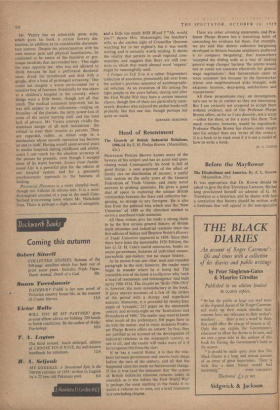Head of Resentment
PROFESSOR PHELPS BROWN knows many of the byways of his subject and has an acute and ques- tioning mind. Consequently his book is full of
good things: a neat argument of the effect of family size on distribution of income; a useful little section on the early years of the General Federation of Trade Unions; and many novel answers to probing questions. He gives a good deal of space to exploring the unique British relationship between the State and collective bar- gaining, so strange to any foreigner. He is also free from the political bias which sees the 'New Unionism' of 1889 as the stimulant needed to revive a moribund trade unionism.
All these virtues give his study a strong claim to be the first serious general history of British trade unionism and industrial relations since the
first edition of Sidney and Beatrice Webb's History of Trade Unionism appeared in 1894. Since then there have been the lamentable 1920 Edition, the late G. D. H. Cole's useful summaries, books on union government, histories of individual unions, journalistic pot-boilers; but no major history.
As he moves from one clear, neat and rounded paragraph to the next, however, the reader must
begin to wonder where he is being led. The
ostensible aim of the book is to discover why 'such a head of resentment and intransigence' had built up by 1906-1914. The chapter on 'Strife 1906-1914' is, however, the most unsatisfactory in the book. It gives uneven accounts of a few of the strikes of the period with a skimpy and superficial analysis. Moreover, it is preceded by twenty-four pages of 'synopsis,' 215 pages on the nineteenth century and seventy-eight on the 'Institutions and Procedures of 1906.' The reader may want to know what much of the preliminary 300 pages have to do with the matter, and in many instances Profes- sor Phelps Brown offers no answer. In fact, they are justified as an account of the development of industrial relations in the nineteenth century, or not at all, and the reader will make more of it if he recognises this from the start.
If he has a central theme, it is that the rela- tions between government and unions took shape before the turn of the century, and all that has happened since has made no fundamental change. If this is true (and the statement that 'the system of British industrial relations remains today in essentials as it was before the First World War' is perhaps the most startling in the book) it re- quires a volume on its own, not a brief treatment in a concluding chapter. There are other arresting statements, and Pro- fessor Phelps Brown has a tantalising habit of concealing his evidence for them. For example, we are told that district collective bargaining developed in Britain because employers preferred it to company bargaining; that ironworkers `accepted the sliding scale as a way of making general wage changes' because `the unions would not or could not associate effectively for general wage negotiations'; that farmwOrkers came to trade unionism late because `to the farmworker labour and neighbourhood alike brought, with exiguous incomes, deep-going satisfactions and reassurances.'
All these propositions may, on investigation, turn out to be as correct as they are interesting. But I am certainly not prepared to accept them without evidence, and of this Professor Phelps Brown offers, so far as I can discover, not a scrap —either for them, or for a score like them. Too much criticism, however, would be ingratitude. Professor Phelps Brown has shown more insight into his subject than any writer of this century. It is a book to be read, even if it is not a model of how to write a book.
H. A. ('LEO.;






































 Previous page
Previous page